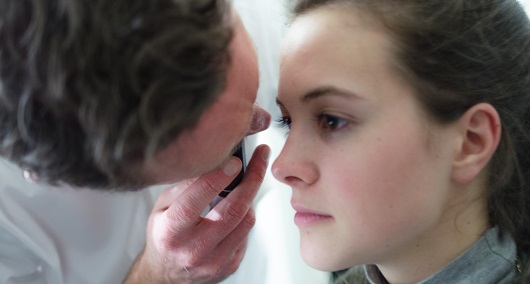Arclight – a medical revolution

A revolutionary pocket-sized device which could help save the sight of millions of people around the world has been launched by a team led from the University of St Andrews.
Arclight is a low-cost, solar-powered ophthalmoscope aimed at helping health workers in low-income countries detect signs of blindness. It can also be used as an otoscope to look into the ears and help prevent deafness. Designed specifically as an easy-to-use tool for outreach or screening programmes in low-income countries it enables users to make instant on-the-spot diagnostic decisions. A study led from the International Centre for Eye Health in London showed that it performs as well as traditional devices costing up to 100 times as much.
Few hospital-based doctors in poorer countries have these essential instruments and almost none at the mid or community level. Using the Arclight an examiner can see the front and back of the eye, helping reveal all major blinding conditions such as trachoma, cataract, glaucoma and diabetes. It is ideal for students or any qualified health care worker in low or high resource health care settings.
Through collaboration with the Fred Hollows Foundation and the International Agency for Prevention of Blindness, thousands of units have already been distributed to countries around the world, including Malawi, Ethiopia, Kenya, Tanzania, Rwanda, Ghana, Fiji, Indonesia and the Solomon Islands, enabling healthcare workers to perform comprehensive eye and ear examinations for the first time.
Dr Andrew Blaikie is a Clinical Academic at the University of St Andrews, who also works as an Eye Surgeon at Queen Margaret Hospital with NHS Fife. Working with colleagues at the University of Leicester and University College London, he has been a central member of the team steering the development and testing of the Arclight. A recent article in the Christmas issue of the British Medical Journal highlighted the role St Andrews’ Global Health Team has had in this process.
Dr Blaikie said: “Arclight is the result of years of hard work by a small team of enthusiasts. These efforts have brought simple, frugal yet highly effective tools to health care workers who would otherwise be unable to make the early diagnoses needed to prevent needless blindness.
“The work of the Global Health Team at St Andrews has helped focus attention on the exact needs and challenges of health care workers in low-income countries. We now aim to add internal memory loaded with teaching material and a clip to allow image capture with mobile phone cameras to the next version of the device. At the same time we are developing several other potentially disruptive low cost diagnostic tools aimed at serving the needs of health care workers in poorer countries.
“Our studies have also shown the device is an ideal tool for medical students and doctors in the UK too, and through sales here and in other wealthy nations we aim to cross-subsidise distribution to poorer countries such as Malawi, where Scotland has strong historical links.”
The University of St Andrews has now established a spin off company to promote sales of the device and coordinate the subsidised distribution to low income countries.
Professor David Harrison, Director of Research in the Medical School at St Andrews, said: “Arclight shows how university, health services, industry and partners overseas can work together to meet global needs in a realistic and effective manner. We will be providing this versatile and clever instrument to our medical students as they enter clinical training.”
Captions
Dr Andrew Blaikie using Arclight on a student
Video courtesy of Arclight
Notes to news editors
Issued by the University of St Andrews Communications Office, contactable on 01334 462530 or [email protected].
International Agency for the Prevention of Blindness (IAPB)
The IAPB leads international efforts in blindness prevention activities. Its mission is to eliminate the main causes of avoidable blindness and visual impairment by bringing together governments and non-governmental agencies in the planning and implementation of sustainable national eye care programmes.
The Standard List is a procurement and budgeting platform for eye health services in developing countries. IAPB members can access carefully evaluated products and technologies from trusted suppliers, at specially negotiated prices.
The Fred Hollows Foundation is a not-for-profit, non-governmental, international development agency focused on eliminating avoidable blindness. Working throughout the world and within the indigenous Australian community, it concentrates on the comprehensive treatment of cataract blindness, but also trachoma, diabetic retinopathy, and refractive error. The Foundation was established to continue the work of the late Professor Fred Hollows (1929-1993).
Global facts on blindness
- About 285 million people have significant visual impairment or are blind (39 million alone).
- Up to 80% of blindness is preventable, often with timely, simple and low-cost interventions.
- Uncorrected refractive errors are the main cause of visual impairment.
- Cataracts are the leading cause of blindness.
Category Research